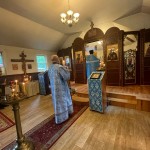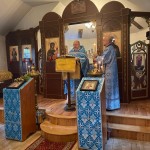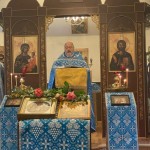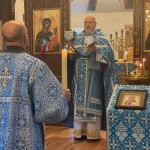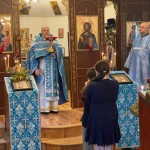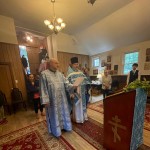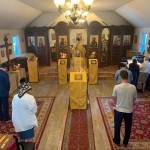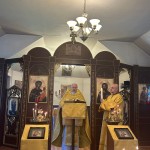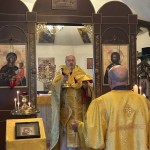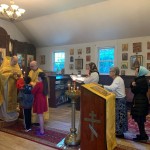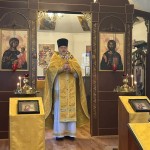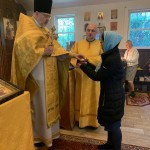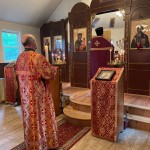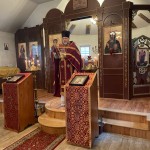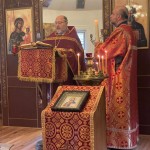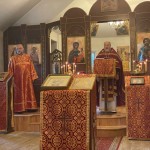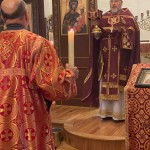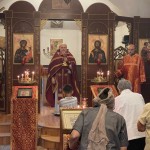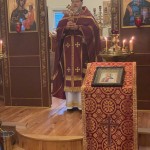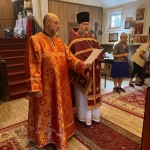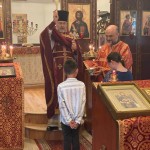On September 24, on the Sunday before the Exaltation, our parish had a beautiful celebration. In addition we observed feast of the Nativity of the Most Holy Mother of God transferred to Sunday. The Divine Liturgy in our temple was served by the Rector of St. George Church, Archpriest Igor Tarasov. After the readings from the Sacred Scripture he preached the following homily:
“Dear brothers and sisters in Christ! On a Sunday preceding the feast of the Exaltation of the Cross we are given a separate set of readings from the Sacred Scripture. The Church does so to make us aware of the special meaning of the Cross of Christ. And today we also observe feast of the Nativity of the Most Holy Mother of God. So, we had two sets of Scripture lessons. Today’s first Epistle lesson from the Letter of St. Paul to the Galatians concerns with the issue the first Christians had, the issue whether they should keep the Jewish customs and retain circumcision or not. St. Paul says, “For in Christ Jesus neither circumcision nor uncircumcision avails anything, but a new creation” (Gal. 6, 15). It does not really matter whether we are circumcised or not, but we have to be the new people in Jesus Christ”.
“St. Paul is teaching that it is not something external on our bodies that distinguishes us as Christians. It is something internal, spiritual. Through Christ, through Baptism, through repentance and the Holy Spirit we have become new people, a new creation. Jesus Himself said, “Behold, I make all things new” (Rev. 21, 5). In Christ we are a new creation. He established the New Testament, thus the followers of that New Covenant have to be the new people, people who put off the old Adam and put on the new. “Put off… the old man which grows corrupt according to the deceitful lusts… and put on the new man which was created according to God”, says St. Paul in another Epistle (Eph. 4, 22-24). Thus, we have to be a new creation”.
“The Nativity of the Most Holy Theotokos became the sign of the beginning of that new era of human history. Today we celebrate the birth of the One who became the Mother of Christ. She Herself was an example of a new person, a representative of that new creation in Christ”.
“But even for us, unfortunately the task of becoming the new people in Christ is still very difficult. Sometimes we do not see a difference between believers and unbelievers, between Christians and non-Christians. If we look at the human history, we see that man’s external environment has changed very much, especially recently, with the great achievements in science and technology. However, human nature did not change. Some wise man said, “Man has exalted change in everything but himself”. Man can change his appearance and the way he lives, but the most important change he does not make, a change inside of his soul. Unless man changes inside, unless he is born again, all the changes in science, technology or in our environment will be of no avail”.
“The wise man of the Old Testament said, “There is nothing new under the sun” (Eccl. 1, 9). At that time, centuries before Christ he could not see anything new. But today we know that the only new thing under the sun is the life in Christ. We know that the Most Holy Theotokos was the new creation, a Most-Pure Virgin, the New Eve, a perfect female person of the New Testament”.
“Sometimes people say that eternal life means our continuation in children. It is true to some extent. Our sons and daughters look like us, behave like us, have our traits. Holy parents of the Theotokos, Joachim and Anna thought that they did not have such a continuation. They were first deprived of the hope to have a future in their children. But even people blessed by the offspring could not have the true eternal life. Every generation before the coming of Christ lived under condemnation, lived in the fallen state. Children looked like their parents, behaved like their parents and repeated their parents’ sins and mistakes. Only with the coming of the Divine Savior into the world, only with the incarnation of the Son of God, the human race was given a future to become holy and to join God in the eternal life. Such life was granted, the ancestral curse was broken through Jesus Christ redeeming us. But in order to accomplish that Jesus had to be born as a Man. And His birth was given by the Most Holy Theotokos. She had to come to this world first. And She did, and today we celebrate Her wonderful Nativity”.
“Therefore, dear brothers and sisters in Christ, let us really build our lives the way we may be seen as the new people, people distinguished from the unbelievers. Let us be that new creation. Not circumcision or other external sign should distinguish us, but the sign of the Cross. And not just a visible sign, a cross we make or a cross we wear on our chests. Let us imitate the Lord crucified in our way of life, so we may say as St. Paul said in today’s Epistle lesson, “I bear in my body the marks of Lord Jesus” (Gal. 6, 17). St. Paul had spiritual marks of the Holy Cross of Christ, because he crucified his flesh with its passions and desires (Gal. 5, 24). If we also crucify our flesh, our passions and sinful desires, then we may become the new people in Christ. These marks won’t be seen, but they will be in our hearts. These marks won’t be external, but internal. They would make us the true members of the Body of Christ, where “neither circumcision nor uncircumcision avails anything, but a new creation” (Gal. 6, 15)”.
The choir director beautifully performed the hymns of the Nativity of the Theotokos during preparation for Holy Communion.
Following the Liturgy dismissal the Rector and the altar server performed the rite of glorification in front of the festal icon singing the troparion, kontakion and magnification of the feast. Then Fr. Igor made some announcements, especially regarding our celebration of the coming feast of the Exaltation. Our planned Liturgy on that day had to be canceled, so we are going to transfer the feast to the following Sunday.
After the services the Rector and parishioners enjoyed delicious meals and a nice company at the coffee hour.

